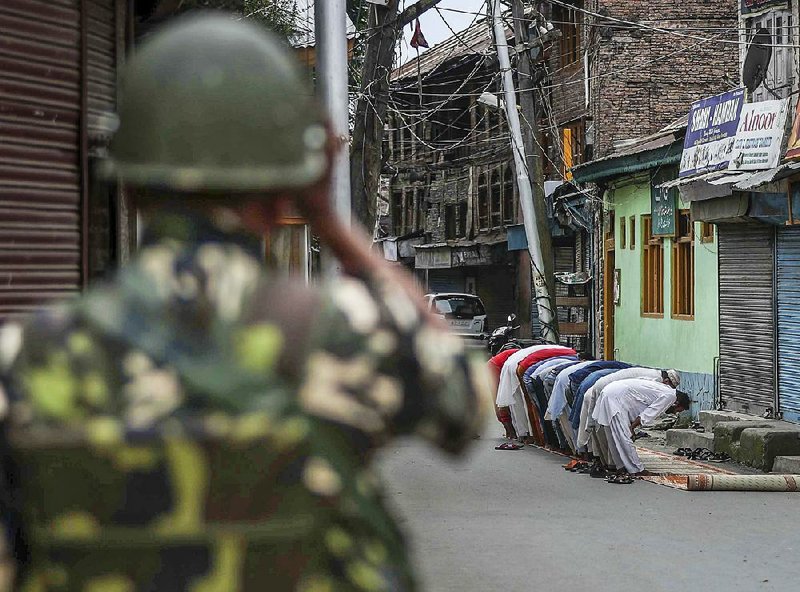NEW DELHI -- India announced Friday that restrictions in Kashmir, which has been locked down for nearly two weeks, would be eased over the next few days, with schools and government offices to reopen Monday and phone service to be gradually restored.
The Indian government unilaterally stripped Kashmir of its semiautonomous status last week. Anticipating unrest, the authorities had detained scores of regional politicians and civil servants, cut mobile and landline connections, and deployed thousands of troops to guard barricaded roads.
Critics said the blackout, unprecedented in its scope, was an egregious attempt to silence voices in Kashmir, a mountainous, predominantly Muslim territory that has been a source of high tension between India and Pakistan, nuclear-armed neighbors that each administer parts of the region.
B.V.R. Subrahmanyam, Kashmir's chief secretary, announced the easing of restrictions shortly after the U.N. Security Council scheduled a rare closed meeting about Kashmir on Friday to discuss India's actions.
The Security Council took no action during the meeting, which was called for by China and Pakistan.
Pakistan's ambassador to the U.N., Maleeha Lodhi, called the meeting "the first and not the last step."
"It will only end when justice is done to the people of Jammu and Kashmir," Lodhi said.
"This is the first time in over 50 years that this issue has been deliberated upon by the Security Council," Lodhi said. "I think this meeting nullifies India's claim that Jammu and Kashmir is an internal matter for India."
India's U.N. ambassador, Syed Akbaruddin, insisted its recent actions on Kashmir were "entirely an internal matter" with "no external ramifications." He rejected comments by Lodhi and China's U.N. ambassador, Zhang Jun, that Kashmir is an international dispute, insisting it is bilateral.
Akbaruddin said India is committed to the 1972 Simla agreement calling for India and Pakistan to peacefully resolve Kashmir's status, saying: "It's now for Pakistan to make that commitment, too -- stop terror to start talks."
He dismissed a 1948 Security Council resolution promising a U.N.-sponsored referendum on Kashmir's "final disposition," saying "every new agreement overtakes the past."
President Donald Trump spoke with Pakistani Prime Minister Imran Khan by phone and conveyed the importance of India and Pakistan reducing tensions through bilateral dialogue, said White House spokesman Hogan Gidley.
Pakistani Foreign Minister Shah Mahmood Qureshi also disclosed the conversation, and he added that Trump said he will talk to Indian Prime Minister Narendra Modi on the issue.
Qureshi described it as "a good conversation," adding that Khan described "how delicate, how concerning and how alarming" the situation was.
At a news conference in Srinagar, Kashmir's biggest city, Subrahmanyam said that cutting off the region's communications had been necessary to maintain law and order, and that daily life there was becoming "completely normal."
"We have prevented any loss of human life despite concerted efforts by terrorist organizations, radical groups and continuing efforts by Pakistan to destabilize the situation," he said.
But many Kashmiris said they were still seething after the government removed the region's limited autonomy, which has been in place since the 1940s, and cut the Indian state of Jammu and Kashmir into two union territories.
The demotion puts Kashmir more tightly under the control of India's governing Bharatiya Janata Party, a Hindu nationalist party that has promised for decades to remove the region's autonomy. Critics of Modi regard the decision as an attack on India's secular identity and an affront to democracy.
In recent days, there have been sporadic street protests in Kashmir involving thousands of demonstrators. Security forces have responded in some cases by firing pellets into crowds, injuring several people.
Young and old demonstrators took to the streets Friday in Srinagar. They carried green Islamic flags and signs reading "Stop Genocide in Kashmir, Wake Up World."
Some threw stones and clashed with security forces, who responded with tear gas.
Last weekend, the authorities sealed off main roads and deployed surveillance helicopters in Srinagar ahead of Eid al-Adha, one of the holiest days on the Muslim calendar. Many Kashmiris were furious that they could not call relatives to tell them they were safe.
Tensions with Pakistan, which has a history of funding separatist militants in Kashmir, have also escalated. Last week, Pakistani officials cut all bilateral trade with India, expelled India's top diplomat and said they would not rule out war, although a conventional military response would probably be too expensive for Pakistan.
Pakistan's army said Thursday that at least three of its soldiers, two civilians and five Indian soldiers had been killed in an exchange of fire along the disputed border, known as the Line of Control. India denied any loss of life.
On Friday, Defense Minister Rajnath Singh hinted that India could change its "no first use" policy on its nuclear weapons.
"What happens in future depends on the circumstances," he wrote on Twitter.
Usman Rashid, 22, a Kashmiri shop owner visiting New Delhi, said he was skeptical that the Indian government would lift the restrictions in Kashmir quickly, considering how upset people there were. Rashid said he expected mass protests once communications were restored.
"Whatever harm the Indian government has done to Kashmiris, do you think they will not come out to seek revenge and vent out their anger?" he asked. "The situation will worsen."
Information for this article was contributed by Kai Schultz and Suhasini Raj of The New York Times; and by Ashok Sharma, Edith M. Lederer, Munir Ahmed and Sheikh Saaliq of The Associated Press.
A Section on 08/17/2019
